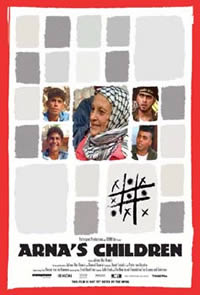You can help expand this article with text translated from the corresponding article in Hebrew. (April 2011)Click [show] for important translation instructions.
|
| Arna's Children | |
|---|---|
 Theatrical release poster | |
| Directed by | Juliano Mer Khamis Danniel Danniel |
| Produced by | Osnat Trabelsi Pieter van Huystee |
Release date |
|
Running time | 84 minutes |
| Countries | Israel Netherlands |
| Languages | Arabic Hebrew |
Arna's Children is a 2004 Dutch-Israeli documentary film directed by Juliano Mer Khamis and Danniel Danniel. The film's story revolves around a children's theater group in Jenin in the Palestinian territories established by Arna Mer-Khamis, the director's mother, an Israeli Jewish political and human rights activist.
Contents
The film portrays the lives of Arna Mer-Khamis and the children members of the theater including Ala el-Sabagr, Zakaria Zubeidi, Daud Zubeidi, Majdi Shadi, Haifa Staiti, Nidal Swetti, Yussef Swetti, Mahmoud Kaneri, Khairia Fakhri and Ashraf Abu-Alheji. [1] [2] [3] [4]
The film won "Best Documentary Feature" in the 2004 Tribeca Film Festival.